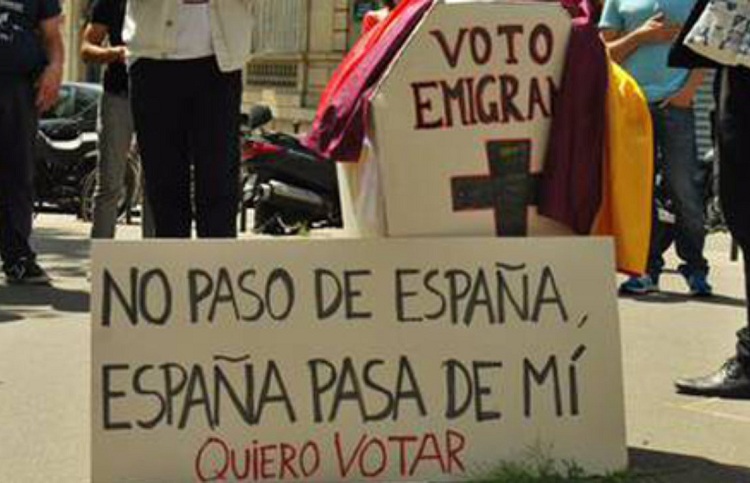The Diplomat
The Bureau of the Congress has admitted for processing the Proposition of Law presented by the Socialist and Unidas Podemos Parliamentary Groups of to abolish the requirement of the requested vote for Spaniards residing abroad.
The requested vote was introduced in 2011 by the Government of Socialist José Luis Rodríguez Zapatero with the support of PSOE, PP, CiU and PNV and, since then, it has resulted in a sharp decline in the participation of those registered in the Census of Absent Residents (CERA). For example, participation levels were between 4.73 and 6.8 percent in the 2011, 2015, 2016 and 2019 general elections, percentages that contrast sharply with the average participation data prior to the approval of the 2011 reform, which ranged from 22.99% in 2000 to 31.88% in 2008.
The proposal -presented last February 4, admitted to the procedure five days later and published last Friday by the Official Gazette of the Cortes Generales (Spanish Parliament)– reminds that the Organic Law of the General Electoral Regime (LOREG), in its last reform of 2011, establishes that Spaniards residing abroad who wish to exercise their right of active suffrage in general, regional or European Parliament elections in Spain, “must previously request or beg to vote, complying with a series of very short deadlines both for the request of the electoral documentation and for the remission of the vote by postal mail or its deposit in the ballot box”.
This requirement of the vote by request, in the opinion of the proponents, “entails a duplication of the administrative procedures necessary to exercise the right of active suffrage”, since, according to the Organic Law of the General Electoral Regime, “the inscription in the census supposes meeting the requirements to be a voter and not being deprived, definitively or temporarily, of the right of suffrage” and, therefore, “the inscription in the electoral census, whether in that of Spanish residents in Spain or in that of Spanish residents absent, is done ex officio”. “Consequently, the need for those registered in the Census of Absent Resident Spaniards to request their vote implies the existence of two very different regimes to exercise the fundamental right contained in Article 23 of our Constitution to participate in public affairs through representatives elected by universal suffrage“, the proposal continues.
Besides, “this duplication of procedures has to be carried out in a short period of time, which, together with the dependence on foreign postal services, makes it difficult to comply with the deadlines set forth in the electoral regulations and prevents the exercise of this fundamental right to a very large number of citizens”. For all these reasons, “the combination of the requested vote and the deadlines foreseen in the electoral regulations has resulted in a very significant reduction in the levels of participation of voters living abroad”.
The proposed Law intends to “respond to the demands of the Spanish community abroad and eliminate the requirement that Spaniards living abroad have to request or beg to vote, which will allow everyone to receive the documentation at home”. This reform also foresees “the use of a ballot paper that can be downloaded telematically” and that “will allow to bring forward the deadlines for sending the electoral documentation” and is completed with “an extension from three to seven days of the deadlines for the deposit of the vote in the ballot box”. Besides, it maintains the possibility of sending the vote by mail to the corresponding Consular Office, “in case the voter cannot go to vote in the office enabled for that purpose”, and includes an extension of the term for the opening of the votes cast from abroad from three to five days, among other measures. The proposal maintains the voter identification system introduced in the 2011 reform.
The Foreign Action Strategy 2021-2024, approved at the end of January by the Council of Ministers and which the Minister of Foreign Affairs, EU and Cooperation, Arancha González Laya, will defend next February 18 before the Foreign Affairs Committee of the Congress, commits to promote “the necessary reform of the electoral law to simplify the requirements for participation in all electoral processes of Spaniards abroad”.






